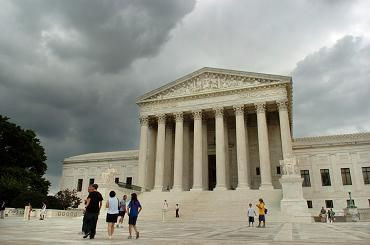US Supreme Court Could Strike Down Key Section Of Voting Rights Act

A key section of one of the United States’ landmark civil rights laws is in danger of being overturned by the nation’s highest court. Again.
The U.S. Supreme Court has agreed to hear a challenge to the constitutionality of Section 5 of the Voting Rights Act this term, a provision of the law requiring states and other jurisdictions with a history of racial discrimination in voting to clear all election-related laws with the U.S. Department of Justice. The court announced it would take on the case, Shelby County v. Holder, only days after the 2012 election, a campaign season where reports of voter suppression efforts were numerous.
The Voting Rights Act has been extended four times since its passage in 1965. The latest extension occurred in 2006, when both the U.S. Senate and House of Representatives overwhelmingly agreed to enact Section 5 for another 25 years.
There have been constitutional challenges to the provision each time it has been up for congressional approval. A 2009 challenge from the Northwest Austin Municipal Utility District No. 1 in Texas -- when the Supreme Court upheld the Voting Rights Act in an 8-to-1 vote -- did not ultimately settle the constitutionality of Section 5, which opponents argue is an enormous breach of states' rights by the federal government.
“Everybody knew someone was going to file another challenge,” said Laughlin McDonald the director of the American Civil Liberty Union’s Voting Right’s Project.
The fact that the court is hearing another challenge to the civil rights law just three years after the prior ruling would give credence to the belief that opponents are optimistic about prevailing this time. And indeed they do have a good chance to win. The current court, led by Chief Justice John Roberts, is not generally supportive of laws it believes support racial preferences. Justice Clarence Thomas said Section 5 was unconstitutional in his dissent in the 2009 case, where Roberts in his opinion stated the provision “caused Members of the Court to express serious misgivings about its constitutionality, mainly due to the decades-old coverage formula.”
That "coverage formula," which determines whether a jurisdiction must report new voting regulations to the Justice Department, is the issue at hand in the Shelby County case. At the time of its enactment in 1965, states were subject to Section 5 if they instituted some kind of “test or device” restricting the opportunity to vote (think poll taxes), and if less than 50 percent of voting age residents were not registered to vote – so basically, most of the South.
The formula was expanded in 1975 to include jurisdictions that provided election materials only in English when members of a language minority made up more than 5 percent of voting-age citizens.
Shelby County, Ala., is arguing that the coverage formula in the Voting Rights bill was written to apply to Jim Crow- and segregation-era restrictions that are not applicable any longer. At least seven states have filed an amicus brief, saying the law is anachronistic, as well as time-consuming and expensive.
But McDonald said it's clear the preclearance provision is still necessary in light of the 2012 election, when the surge of voting law changes brought it back to the national spotlight. Florida faced a legal challenge from the Department of Justice when it passed a statewide law reducing early voting to eight days, a lawsuit that was dropped after the state agreed to submit a revised plan.
“If jurisdictions are willing to target black and Hispanic voters who tend to vote Democratic then I think its fair to say Section 5 is still applicable and even necessary,” McDonald said.
Plus, under the law's "bailout" process, covered jurisdictions can be exempted if they can prove there has been no discriminatory voting practices for at least 10 years and has taken actions to improve minority voting opportunities. McDonald said it is the "strongest constitutional argument" in the preclearance provision's favor, because it demonstrates federal oversight in those areas is not never-ending.
And yet, the plethora of voting laws passed this year – such as government-issued photo ID requirements (Alabama, Mississippi, South Carolina, Tennessee, Texas); early-voting cutbacks (Florida, Georgia, Tennessee); and the permanent disenfranchisement of ex-felons (Florida, Iowa, Kentucky and Virginia) – may not be factors argued before the court. According to Loughlin, because Shelby County is specifically challenging the 2006 extension of the Voting Rights Act, events that happened after 2006 will not be up for consideration.
But it’s not like those events can be completely obliterated from the justices' knowledge, especially among the moderate and liberal members of the court.
“My own opinion is that all of these things are relevant and should be considered by the court. I don’t know how the Supreme Court can play its proper role while ignoring that, and ignoring the overwhelming judgment of Congress in 2006,” McDonald said.
© Copyright IBTimes 2024. All rights reserved.





















